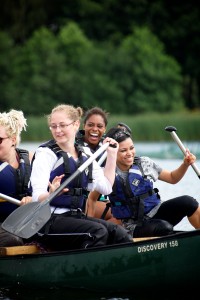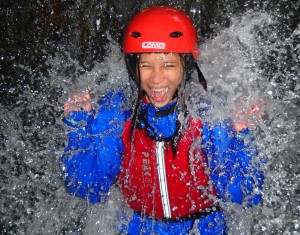What we do
 Aims
Aims
EOC is a forum of the principal representative organisations operating in the field of outdoor learning, training and recreation. Its role is to carry out those lobbying, influencing and representational roles on behalf of the outdoor sector that are more effectively dealt with by an umbrella body than by individual organisations. Its current business plan aims are:
1. To continue to develop the role of EOC as an effective umbrella body for the sector. Encouraging member organisations to work together and combine resources, when appropriate, to further the cause of outdoor and adventurous activities and outdoor learning.
2. To promote and disseminate the importance of progressive outdoor and adventurous activities and outdoor learning for young people.
3. Lobby for a clear and consistent message about the benefits of outdoor learning as a valuable educational approach, underpinned by research and case studies.
4. Create an expectation that all young people, including those who could not afford to do so without financial support, should have access to a broad range of outdoor learning experiences, including at least one residential experience at each key stage.
5. To disseminate the advantage of a balanced view of risks and benefits and to promote an adventurous approach to life.
6. To ensure that there is proportionate safety and quality assurance for outdoor activities. That it is an effective and straight forward process for ensuring safety and quality in the delivery of outdoor activities which is respected by the sector and recognised by our users.
7. To review societal trends to maintain a future focus and identify possible opportunities for the outdoor sector.
Specific actions for the year ahead to achieve those aims include:
- Working with the CLOtC Sector Working Group launch an Outdoor Learning Charter to support out lobbying work.
- Promote the use of the EOC lobbying paper that can be used by others to provide a basis for a discussion with their MPs.
- Continue to make links to key decision makers in Government
- Contribute to the work of the Council for Learning Outside the Classroom and Sector Partnership working.
- Circulate newsletters at half-yearly intervals and Briefing Papers every month.
- Develop and publicise models of good practice within the sector.
- Maintain a good flow of positive publicity outside the sector.
- Update the section on research on the EOC website and through the EOC document ‘Meeting the Challenge’.
- Continue to act as the parent body of the Campaign for Adventure and support its ongoing activity.
- Support Outdoor Adventure Week in the last week of May.
- Continue to publicise risk/benefit assessment to providers and users, and promote the positive aspects of sensible risk-taking.
- Support AAIAC in developing a sector led solution around a suitable range of inspection and accreditation for Adventurous Activities.
- Work with CLOtC to maintain quality accreditation in the sector.
- Continue to promote greater use of the outdoors by minority groups.
- Support and promote the use of the ‘outdoors’ as a positive impact on health and well-being working closely with the National Outdoors for All Working Group
- Monitor and encourage research to evaluate the effectiveness of outdoor provision
- Support the development of industry led CPD and the development of effective apprenticeship schemes that reflect the needs of the sector
- Challenge and respond to policy proposals and consultations.
Lobbying
Part of the role of the English Outdoor Council is to increase the profile and lobby for the outdoor industry. It seeks through government agencies, educational bodies, MP’s and a range of officials to make the case for the benefits of the outdoors for all ages but in particular for young people. Sometimes the Council or its members will speak up for a better balanced understanding between risk and safety. Members of the Council have been closely involved in the Council for Learning Outside the Classroom.
If you have issues that you want raised with officials and Parliamentarians contact the Council or one of its constituent members.
Representing the sector
The outdoor sector is made up of a range of voices. One of the aims of the Council is to bring those groups together under one ‘umbrella’ in order to speak with a single voice to key groups. Whilst the Council only represents England, it has close ties with other bodies in the UK that have a similar role.
Safety
In the context that the government has decided to repeal the law on adventure activity licensing, the Council considers that Adventuremark is an excellent way for providers to demonstrate compliance with accepted safety standards. Full details are at http://www.adventuremark.co.uk/.
What are the benefits of the outdoors?
 Outdoor education, training and recreation promote active learning through direct personal experience and offer excitement, fun and adventure within a framework of safety
Outdoor education, training and recreation promote active learning through direct personal experience and offer excitement, fun and adventure within a framework of safety
Active learning and adventure outdoors can take place in a variety of environments: rural and urban, local and more remote. Outdoor education, training and recreation involve both young people and adults in a wide range of experiences, including adventurous activities on land and water and activities with an environmental focus. Methods used include skills-focused learning, problem solving, team building and self-reliant journeys and activities, with residential experience an especially valued feature.
Progressive challenging experience outdoors impacts powerfully upon a young person’s intellectual, physical, spiritual, social and moral development.
Use of the outdoors makes a major contribution to physical and environmental education and enhances many other curriculum areas. It contributes to personal growth and social awareness and develops skills for life and the world of work. Qualities such as a sense of responsibility and a purpose in life are nurtured. There is also a great deal of intrinsic enjoyment and satisfaction to be experienced from participation in outdoor activities.
Britain has a long tradition in the field of outdoor education, training and recreation, reflecting the strong place of exploration and adventure in the British heritage.
Exceptional accomplishments in exploration and adventure, on the sea, in the mountains and in the world of nature, feature strongly in our country’s history. Reflecting this heritage, Britain has led the way in the use of outdoor learning and adventure for the development of young people, for example, through the Scout and Guide movements, Outward Bound and the Duke of Edinburgh’s Award.
Building self-confidence and self-esteem is fundamental to any young person’s development.
Outdoor activities provide valuable alternative, often non-competitive, avenues for achievement, as well as opportunities to develop independence and self-reliance. Through successfully facing up to the challenges which outdoor activities provide, overcoming fears and apprehensions along the way, young people make major strides in confidence, with implications for all aspects of their development.
A positive attitude to learning is essential if young people are to make the most of their education.
Participation in exciting and enjoyable outdoor activities with teachers, youth workers and peers reinforces a positive attitude to education and contributes significantly to the general ethos of a school or youth group. Direct experience out of doors stimulates and reinforces learning across many areas of the curriculum, and the use of the outdoors encourages young people to take greater responsibility for their own learning.
Awareness of the needs and contributions of others and the ability to sustain effective relationships, at work and in the family, are vital in today’s society.
Experience in the outdoors provides rich opportunities for personal and social development through carefully structured group work in challenging situations. Trust, care, tolerance and the willingness to give and accept support are all encouraged and anti-social behaviour is challenged. Opportunities are presented to exhibit and develop effective inter-personal behaviour and to work co-operatively and effectively in teams.
The purposeful use of leisure time is increasingly seen as making an important contribution to a fulfilling lifestyle.
Outdoor recreation introduces young people to a range of worthwhile leisure pursuits which will enrich their future lives, and develops the skills and knowledge essential for safe participation. Outdoor exercise contributes greatly to health and fitness and continuing participation in outdoor pursuits encourages the maintenance of a healthy lifestyle into middle age and beyond.
Our relationship with the environment is a key issue facing tomorrow’s citizens.
Active learning and adventure outdoors introduces young people to the environment in a way which develops understanding appreciation, awe, wonder and respect. It fosters sensitivity to the environment, helps young people to see themselves in a global context and helps to develop citizens with an awareness of the need for sustainable use of the world’s natural resources.
Tomorrow’s successful citizens will possess the adaptability to cope with a rapidly changing world of work and the responsibility to be an effective member of a community.
Challenging outdoor experiences promote the development of communication, problem solving and decision making skills which have currency across a range of occupations. They encourage a positive “opting in” and “can do” attitude. Young people’s horizons are broadened, new challenges come to be relished rather than shunned, and perseverance and determination are reinforced. Values and attitudes developed in a context of shared endeavour help to form a sound basis for responsible citizenship.